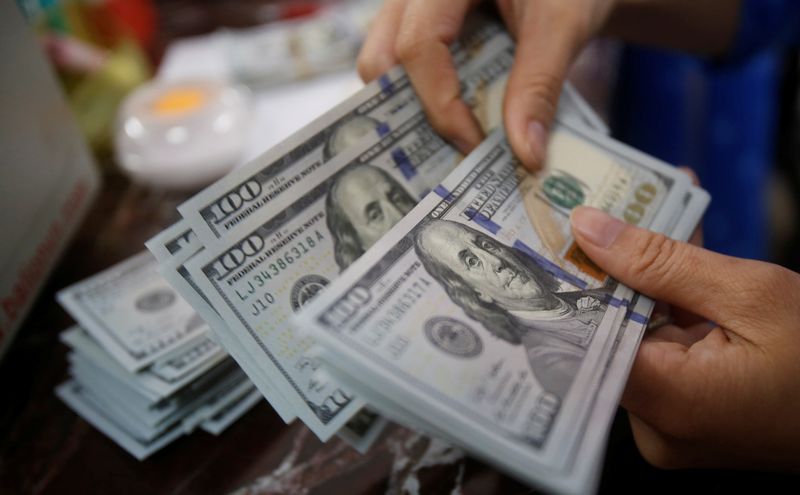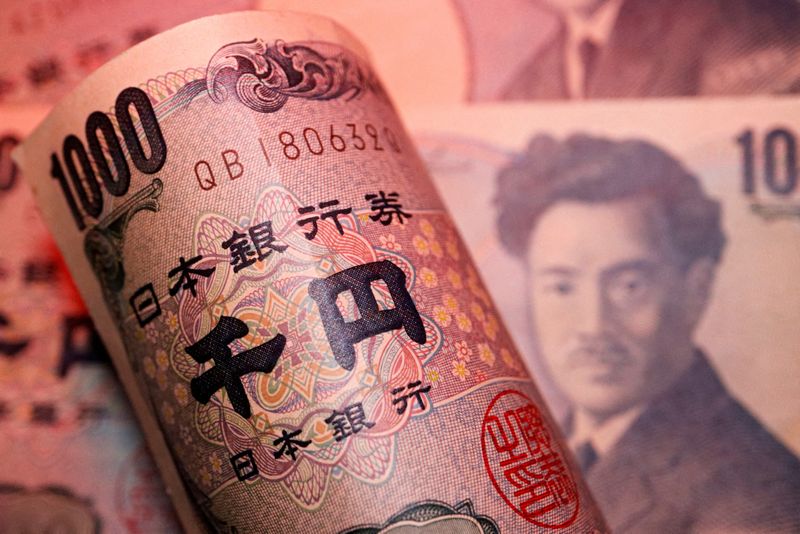By Alden Bentley, Harry Robertson and Kevin Buckland
NEW YORK/LONDON/TOKYO (Reuters) -The dollar held steady on Monday as traders braced for an avalanche of market events featuring midweek policy decisions by the Federal Reserve, Bank of Japan and Bank of England, and what could be a pivotal U.S. employment report for the Fed on Friday.
The yen was little changed following the Japanese currency's strongest weekly rally since late April on the back of shifting interest rate expectations and a stock market sell-off.
The dollar index, which measures the currency against the euro, yen and four other major currencies, rose 0.18% to 104.56. The euro slipped 0.33% to $1.0821.
Dollar/yen was last up 0.13% at 153.995, reversing an earlier decline of as much as 0.49% to 153.04.
Markets have been focused on the surge in the yen over the last week, with rising speculation of a BOJ interest rate hike this week helping buoy the currency, along with the specter of BOJ intervention after several rounds of official yen buying in recent weeks.
Win Thin, Brown Brothers Harriman's global head of market strategy, said in a client note that the yen will likely struggle to gain further upside momentum, with the BOJ likely to deliver a dovish hike at its meeting on Wednesday.
The U.S. Federal Open Market Committee (FOMC) is widely expected to leave rates unchanged this week, but to cut them by a quarter point at the following meeting in September.
While the FOMC does not meet in August, Fed chair Jerome Powell could use the Jackson Hole gathering of central bankers in late August to prepare the market for a rate cut. By then more data on inflation and Friday's July employment report will be available for policy makers to weigh conditions for a September cut.
While U.S. Japan yield differentials are thus expected to narrow, it does not look like the near-term carry trade advantage of borrowing/shorting yen to fund investments outside of Japan will erode significantly in the coming two months.
"The market doesn't have much conviction right now. It doesn't have much conviction, because everybody is reading from same song book, what would be called a 'dovish hold' by the Fed," said Marc Chandler, chief market strategist at Bannockburn Global Forex in New York.
MARKET MOVES
Data released on Friday showed investors have sharply cut back on their bets against the yen, which was trading at a 38-year low at the start of the month.
"Sentiment remains fragile," said Shinichiro Kadota, a currency and rates strategist at Barclays (LON:BARC) in Tokyo.
Ultimately, "U.S. equities are still the key," Kadota added, referencing the demand for safe-haven currencies like the yen seen during last week's stock market rout. "Market moves have been led by U.S. equities, and we need to see if things stabilize there."
Wall Street was steady on Monday, coming off a volatile week marked by a deep two-day shakeout on worries about megacap earnings. The U.S. earnings calendar this week is populated with heavyweights including Amazon.com (NASDAQ:AMZN), Apple (NASDAQ:AAPL), Meta (NASDAQ:META) Platforms and Microsoft (NASDAQ:MSFT).
Currency traders also face a Bank of England meeting on Thursday, where the odds of a first rate cut are seen as a coin toss. British bond yields fell on Monday, weighing on the pound.
There was little reaction in sterling after Britain's new finance minister, Rachel Reeves, announced spending cuts worth 13.5 billion pounds ($17.3 billion) over the next two years to help plug what she said was a 22 billion-pound overspend caused by the previous government.
The pound wrapped up 0.01% easier at $1.28645.
"There are lot of big things happening this week and this is still market-positioning ahead of those events," said Chandler.

Elsewhere, the Australian dollar was 0.02% firmer at $0.6548, attempting to recover from Friday's low of $0.65105, a level not seen since the start of May.
Leading cryptocurrency bitcoin was 1.22% lower at $67,390, shaking off positive comments from Republican presidential candidate Donald Trump, who told a bitcoin conference on Saturday that the U.S. must dominate the sector or China would.
